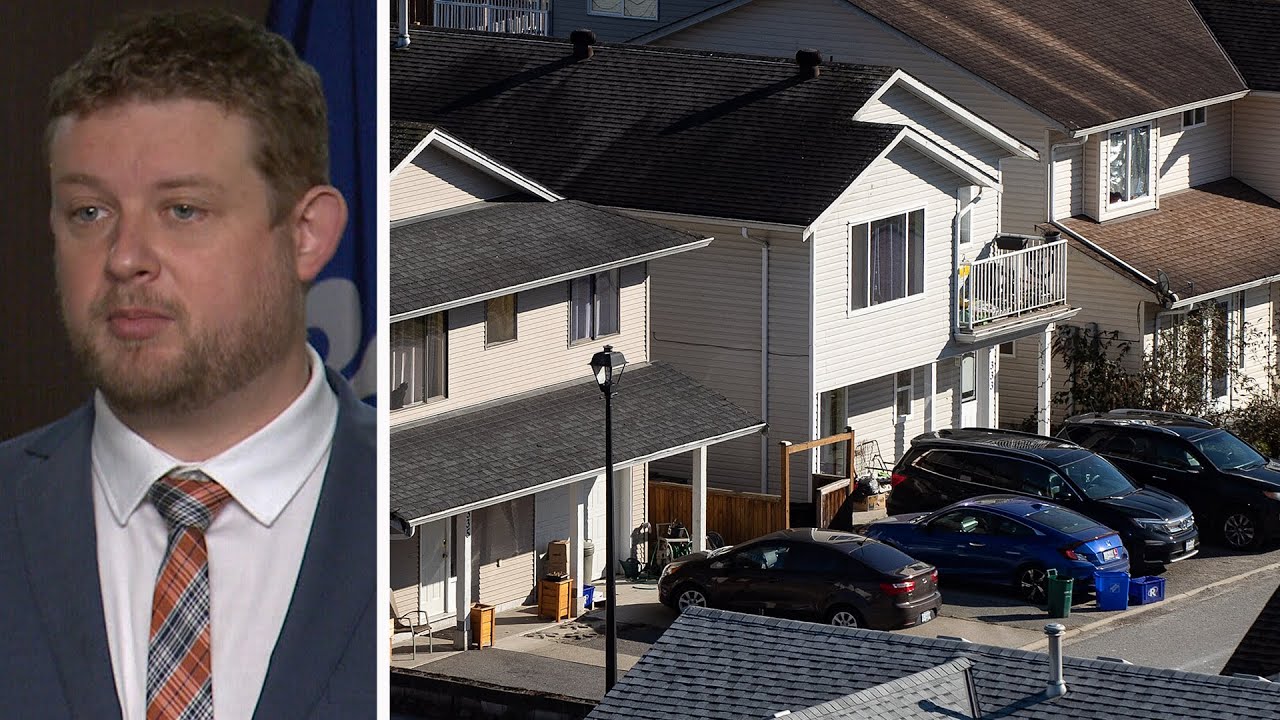Transcript: Canadians that are trying to either buy their own home, rent an affordable home, or in the case of Peggy, trying to stay in an affordable home, are all getting kicked in the teeth. They’re facing these challenges because the market hasn’t been set up for them to compete with families in similar situations with similar incomes. Instead, Canadians wanting to find their way into a home are having to compete with deep-pocketed corporate investors. This is what’s structurally wrong with the Canadian housing market.
There are people out there that’ll tell you different things about that. The Liberals so far have only been willing to take action concerning foreign buyers, but we know they only represent about five percent of the market. Conservatives will argue that it’s government spending, it’s the Bank of Canada, or anything else that diverts attention from the real problem. The genuine issue is the massive corporate profits made by turning what should be a market about people securing a family home into an asset class for profit generation.
This isn’t a phenomenon that occurred by accident. If you delve into the history of real estate investment trusts (REITs), you’ll find that they began their rapid ascent in 1996. Coincidentally, this was right after the Liberals canceled the national housing strategy. The trend has been growing ever since. It’s myopic to focus solely on the last two years and the housing market fluctuations during this exceptional period. The trend of Canadians being pushed out of affordable homes started much earlier than that, and it’s a pattern seen across both Liberal and Conservative governments.
These administrations have been lacking in supply-side solutions. Additionally, they’ve cultivated a tax culture that rewards companies for buying affordable buildings, ousting tenants, and then hiking rents. Through the tax code, if you’re part of a REIT, you’re exempted from paying corporate tax on your profits, as long as you distribute the income to individual investors. Normally, a company would first settle corporate income tax on its earnings and then distribute its dividends from the remaining amount.
Another way the housing market has been undermined is by both Liberal and Conservative governments not renewing operating grants linked to many affordable buildings, be it co-op housing or non-profit housing. Federal operating money made those units more than just affordable – they were rent-geared to income, which is the gold standard for housing. It ensures tenants don’t end up paying an exorbitant portion of their earnings on rent. As these 40 or 50-year mortgages began to expire towards the end of the Harper government’s term, the promise of not renewing these operating grants was made. While the Liberals ran on a commitment to sustain them, they backtracked.
Consequently, buildings across the country that had federal funding, ensuring they could offer affordable rents to tenants, were told by both Conservative and Liberal governments that there would be no funding renewal. This meant they either had to raise the rents or sell their buildings. This situation made them ripe targets for REITs, which had the financial means to outbid non-profit associations experienced in housing.
This is a long-brewing problem, and while the pandemic exacerbated the situation, attributing the crisis solely to pandemic-induced government spending is a mistake. The housing crisis has been building up for ages and has now reached a critical point. We must take actions to stabilize the market and salvage the affordable units we still have. Experts reveal that for every new affordable housing unit we establish in Canada today, we’re losing 15. This rate is unsustainable. The decrease in supply, combined with the detrimental role of REITs and other corporate landlords, is at the crux of the issue.
We need proactive government intervention to address and resolve this problem, ensuring Canadians have access to affordable housing. This is why we’re announcing specific measures today. Jenny has already mentioned imposing a moratorium on REITs and corporate landlords from purchasing affordable buildings. We’ve also discussed establishing a fund so that non-profit housing experts can acquire and manage these buildings appropriately. Another crucial step is eliminating the preferential tax treatment for REITs, which only makes them a more enticing investment option, drawing more capital into a system that’s undermining our housing market.
We shouldn’t be incentivizing investors to exploit a mechanism that makes housing less accessible for Canadians. Our package of solutions aims to conserve affordable units, create more of them, and stop rewarding major investors who profit by forcing Canadians out of homes they can afford, leaving them to fend for themselves.
Meanwhile, the government is allowing The Montreal Shuffle
Let’s say rent is $1000/month for existing tenants:
- Landlords kick-out existing tenants (Renoviction, etc.)
- Landlords rents out the apartments/houses at $4000/month to AirBnB investors. (They don’t care it’s 4x the market rates, they’ll make that back in a week on AirBnB!)
- AirBnB investors list the apartments/houses on AirBnB and make a fortune while the original tenants live in tents!
- Landlords go to the bank and get a mortgage on the same properties now valued 4x higher (b/c they’re making 4x more rent) and can buy more properties.
- Rinse and repeat.
Vacancy control is a policy that would fix this, and has been proposed by the Ontario NDP! It would tie rents to units instead of tenants, which would mean landlords can’t raise rents beyond the rent control guideline when putting a unit back on the market. This removes the incentive for landlords to renovict tenants.
It’s amazing that rent control is ever implemented any other way. The more traditional way ends up in a situation where young people trying to establish themselves are on the hook to subsidize old people who have had a lifetime to amass their wealth, which is pretty silly.
Rent control is one of the only things economists universally agree is bad for long term pricing. It may be great for all the units that exist now, but rent controls reduce new units and over decades it just leads to fewer total units available. Everyone always touts Vienna as an example of “good rent control” and “public housing availability” completely ignoring the multi-year waits for a controlled unit. Desirable locations can be decades of waiting.
What we need is proper taxation of land so that people can’t profit by simply owning it for a long time and watching the land go up in value.
Landlords kick-out existing tenants … they’ll make that back in a week on AirBnB!
So what you’re saying is that more people want to live in a given area then there are places to live? It is true that there is no place in Canada, even its major cities, that isn’t laughably sparse.
Nah, it’s for tourists. Landlords want to run ghost hotels.
We need more dense, transit oriented, non-market housing:
https://www.youtube.com/watch?v=41VJudBdYXY&t=2s&ab_channel=BloombergOriginals
https://www.youtube.com/watch?v=sKudSeqHSJk&ab_channel=AboutHere
Vienna, the capital of “affordability” and MULTI-YEAR WAITLISTS FOR ANYTHING BECAUSE THERE AREN’T ENOUGH FUCKING UNITS. You can’t even get onto the list for a unit until you live in Vienna for two years. You can’t make too much money either, 80k Euros total for a couple, but you can’t afford to move to Vienna for the 2 years to even get on the waitlist unless you make more than the amount to get accepted onto the waitlist.
And don’t even think about trying to move once you’ve got a unit either. That isn’t happening.
Goddamn do I hate when people try to use Vienna as an example of things working well.
This strikes me as a convenient scapegoat more than anything. None of the major parties dares admit that more affordable housing would require home prices to drop
So let’s blame the scary REIT bogeyman!
It’s definitely corporations. It has been for a long time. I knew that corporations were pushing up housing prices for at least 10 years.
Well, that proves it then.
Man I wish more people used /s
I haven’t seen any stats to back this up? I’ve seen lots showing FTHB being overtaken and replaced by mom and pop investors though.
I’m not going to do your research for you, but I’ll do you the favour and provide this: https://www.cbc.ca/news/business/real-estate-investment-firms-financialization-housing-1.6538087
We’ve gone through a very long time at very low interest rates. This means that investors who would normally buy bonds for safekeeping have no choice but to put their money elsewhere. For example, stocks and Real estate.
Due to the free money that we had before interest rates started to rise, stocks were at an all time high but it’s not based on fundamentals and higher earnings, so P/E ratios have gotten worse. And there has yet to be a big market correction (that is coming). This makes value investors nervous, but again, there’s nowhere else to put the money that gets a good return.
So what would you do if you can’t buy treasury bonds and the market is a big bubble? Real estate. Also, the real assets is good to offset any bad bets a corp made in the casino we call a stock market.
So yeah… corporations. All you have to do is follow the money. It’s always the same old story. Raw greed and political corruption.
It’s a known problem in the US, there just hasn’t been any data showing it’s an issue in Canada (yet), that I’ve seen.
But statscan does have data on mom and pop investors:
- The proportion of investors among owners varied from 20.2% in Ontario to 31.5% in Nova Scotia.
- Among houses and condominium apartments, just under one in five properties was used as an investment in British Columbia, Manitoba, Ontario, New Brunswick and Nova Scotia combined.
It can’t be corporations.
66-68% of Residential properties in Canada are owned by the family living in them. Another 15-20% are dedicated rental apartment buildings which have to be owned by a corporation in order to be built in the first place.
That leaves 10-15% of the whole market to be owned by “Corporations” except most of that remaining amount is just regular people who own two or three homes either for themselves(summer cabin, etc.) or to rent out as small time landlords.
I’d bet you money that corporations own less than 5% of all single family homes in Canada.
We need a massive, WW2-style investment in home construction, and we need housing prices to go down. That’s something that the NDP believes in more than any other party. Take a look at this response in the last leader’s debate, where Singh actually pushes back on the notion that housing should be an investment and prices should keep going up. You think Poilievre or Trudeau are going to say anything like that?
The fact is though, that REITs are buying up massive amounts of property, have perverse tax incentives, and have a lot of political influence through their accumulation of capital over the past decades.
We need a massive, WW2-style investment in home construction
Who is going to do the work, though? Anyone who builds houses is booked up for years to come. Everyone else already has jobs that they like better. You don’t exactly have legions of now-unemployed people returning home from overseas, ready to take on any work available. We have full employment. Everyone who wants a job has one.
Which means you need to make construction a more compelling career. Typically that means paying workers substantially more to get them to take a second look. Which…
and we need housing prices to go down.
…means this can’t happen. The cost of construction is what sets the price for the entire market. Used homes, like cars, are priced by new cost minus the cost of maintaining something that has seen some wear and tear. After all, if a new home was cheap, you’d just build a new home and your problems would be solved. But they are what is most expensive. If the new price goes up, it becomes less compelling to build, and so then there is more competition in the used market which drives those prices up too.
There is a solution here: Destroy the job market. Once people are unemployed, then building houses on the cheap becomes realistic. Politically treacherous, though, as people don’t take too kindly to losing their job. Doubly so for the NDP.
You think Poilievre or Trudeau are going to say anything like that?
No, I think they are in it to win it. Singh may be technically correct, but being technically correct doesn’t win friends. In fact, people usually actively dislike those who are technically correct.
Betting the farm on the private-sector to solve the housing crisis is never going to work - and that’s the approach we’ve tried (and failed) to take
Here’s the bitter reality. The houses we’re building are large, detached, single family homes. Our municipalities are subsidizing sprawl by banning dense housing and waiving development charges on new suburbs - even though suburban homes are more expensive to serve with utilities, public transit, policing, and healthcare. That’s where the public money is going - not to more homes, but subsidizing suburban living. Provincial governments have been unanimously onboard with this scheme, and Ontario’s provincial government has just engaged in a nakedly corrupt scheme to enrich developers with over 8 billion dollars worth of Greenbelt land swaps. The federal government has defunded public housing projects for the past 30 years.
Simply saying “we don’t have enough builders” ignores the decades of policy failure, and is an easy way to throw in the towel. But the fact is, we can allocate our existing resources better.
Betting the farm on the private-sector to solve the housing crisis is never going to work - and that’s the approach we’ve tried (and failed) to take
Implying slavery? Otherwise labour will always exist in the private sector. It is not deemed capital able to be bought and sold by public interests.
Our municipalities are subsidizing sprawl by banning dense housing and waiving development charges on new suburbs … Provincial governments have been unanimously onboard with this scheme … The federal government has defunded public housing projects for the past 30 years.
This is absolutely true. Betting the farm on the public sector to solve the housing crisis is never going to work - and that’s the approach we’ve tried (and failed) to take.
I guess we’re hoping aliens will land to cure what ails us?
Betting the farm on the public sector to solve the housing crisis is never going to work - and that’s the approach we’ve tried (and failed) to take.
Public housing projects have been systemically defunded since the 90s…
Exactly.
…and the housing crisis we’re in started after we defunded public housing… I don’t know why you would advocate for that?
I’ll do the work as long as they pay me a good wage.
But they won’t, so I won’t.
It’s both of these factors and probably a few more. The problem is, the Ford government then takes the narrative of “we need more affordable housing” and uses it to give billions in profits to their donors through rigged Green Belt land swap. So whatever the narrative, the value gets extracted into a small percentage of a percentage of private rich pockets and the public is left to deal with the consequences. The system is past it’s “best before” date. Accountability is at the core of responsible government, but the situation we are in is that any narrative can be exploited to further increase the divide between the haves and the have-nots with almost no accountability (I’m hoping the RCMP deliver on the “potential” investigation into this).
Cool. So when do you guys stop propping up the Trudeau gov’t, and start making them do something.
The fact is, the NDP and conservatives lost the last election. The NDP won 25 seats. And polling right now shows that the conservatives are going to win the next election if it were called tomorrow.
In the last parliament, from 2019-2021, there was also a Liberal minority, with deal between any party. But the Liberals simply got what they wanted because they could count on the support of either the Bloc (when shooting down legislation over jurisdiction), the NDP (for childcare), or the Conservatives (when legislating workers back to work), and have a working majority.
So, the NDP has three options:
- Have little influence and get played like they did from 2019-2021
- Bring down the government, with a high chance of a conservative majority: which would mean tax cuts for the rich, cuts to healthcare, and giant cash handouts to the private-sector for housing that will enrich developers and effectively scam the taxpayer - I mean, just look at Ford’s absolutely transparent greenbelt corruption
- Use their power to broker a deal with the Liberals, guaranteeing them stability in exchange for serious concessions on healthcare (dental care and pharmacare), worker’s rights (paid sick days, anti-scab legislation), climate (phasing out fossil fuel subsidies), childcare (ensuring that care is done by public and non-profit instead of private providers), and housing (a few extra billion dollars, which is wildly insufficient IMO)
Option 3 is probably the best deal. Would an NDP government do more to tackle the housing crisis? Yes, but in the current parliament, with only 25 seats, you get what you can get. I think the NDP should push for more, be more aggressive, and have a more credible threat of pulling the plug in order to extract more from the Liberals, and for that reason, I’m not super excited about the way things are going. I’ll certainly push for more at the party convention.
However, let’s look at the bigger picture. What policy goals have the other parties (including the conservatives) actually accomplished in Parliament over the past decade? They’ve made a bunch of noise, but gotten pretty much nothing done.
The fact is, the NDP and conservatives lost the last election.
And? The election is just the hiring process to select the employees you want to have working for you. Some workers may be more qualified than others, but ultimately it doesn’t really matter who gets chosen at the end of the day. They are all qualified enough.
If, say, the dishwasher at your restaurant wasn’t washing dishes like you hired them to are you going to sit there and say “Oh well. I made a poor choice when electing to hire this person. Maybe I’ll choose better next time.” and not “Fuck man, get the hell to work. I am not paying you to laze around here all day. What the hell do you think you are doing?”
No, of course not. So why would this be any different?
What policy goals have the other parties (including the conservatives) actually accomplished in Parliament over the past decade?
Nothing, I imagine, as the management hasn’t changed. Never has an employee, try as they might, successfully righted a ship being sunk by bad management.







